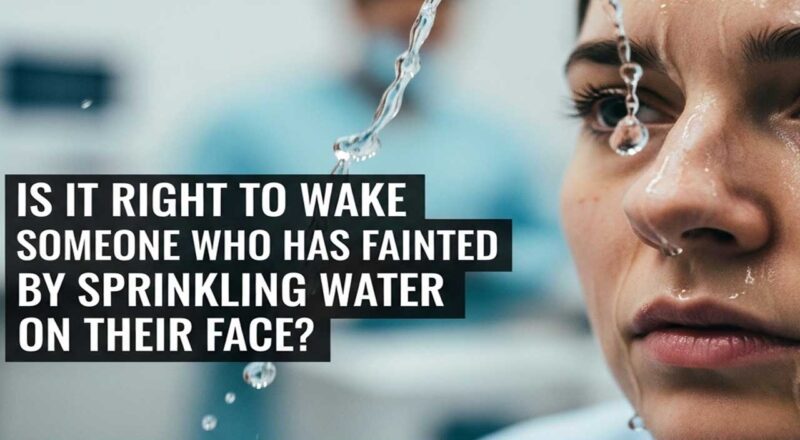Introduction:
Is it right to wake someone who has fainted by sprinkling water on their face? ( sprinkling water on fainted person )
Short details:
Fainting is a sudden emergency. Many people commonly resort to rituals such as sprinkling water on their face or slapping their cheeks. But let’s find out whether this is medically correct or not.
Content description:
- What is Fainting?
- Causes of Fainting
- Common Mistakes Made During Fainting
- Sprinkling Water on the Face – Is It Scientifically Correct?
- How to Provide Proper First Aid to a Fainting Person?
- Wrong Actions – Things to Avoid
- Importance of Social Awareness
- Sources and Medical Citations
What is fainting?
Fainting/Syncope is a temporary condition caused by a decrease in blood flow to the brain. This can cause a person to suddenly lose consciousness. This usually occurs within a few minutes.
Causes of fainting:
- Low blood pressure (Hypotension)
- Chest pain/heart problem
- Low blood sugar level (Hypoglycemia)
- Severe fear, anxiety
- Diabetes or high temperature
- Chronic diseases (Ex, Epilepsy, Stroke)
Common mistakes made during a tantrum:
- Splashing cold water on the face
- Slapping the cheek
- Snorting scents (like Vicks) into the nose
- Lifting while walking
- Crowding to reduce oxygen flow
Splashing water on your face – is it scientifically correct?
False belief:
There is a common belief that “spraying water will wake the person up.” But this is medically unfounded.
Reason:
- Water acts as an external stimulus.
- But if blood flow to the brain is blocked, no amount of water spraying will help.
- Sometimes, a person can stop breathing when water hits their face, which can be dangerous.
What do doctors say?
Instead of sprinkling water on the face, first lower the person’s head slightly and elevate their legs. This will increase the chance of blood flow to the head.
How to provide proper first aid to a fainting person?
- Lay him down flat
- Keep his legs slightly elevated (without a pillow)
- Please do not crowd him
- Wait a while – he should recover spontaneously in 1–2 minutes
- If he does not recover:
- Call for immediate medical help (108 in India)
- Beat, Breathing, Teeth Grinding, Eye Movement – Watch Out
- During recovery:
- It is recommended to visit the nearest hospital and get tests done, like an ECG, BP, sugar, etc.
Wrong actions – things to avoid:
|
Wrongdoing |
Why avoid? |
| Splashing water on the face | Chance of suffocation |
| Slap on the cheek | Additional risk of harm |
| Smelling | Causes sudden shortness of breath |
| To lift and walk | Possible damage to the back and neck bones |
Importance of social awareness
Such bad habits are prevalent in our country. They often create additional risks. Therefore, the following actions can be encouraged:
- First Aid classes in schools and colleges
- Public seminars conducted by community activists
- Videos and presentations through social media
- Government-sponsored classes on “Fainting – Corrective Actions”
Source and medical citations:
- https://www.who.int/home
- Mayo Clinic – Syncope Treatment
- Red Cross First Aid Handbook
- Indian Medical Association (IMA) – Emergency Medical Procedure
- Apollo Hospitals Emergency Care Guide (Tamil version)
Conclusion:
A person who faints is temporarily unconscious. At that time, the main thing is to prevent a fall. Splashing water on the face is an old misconception. Instead, it is important to know and act on the correct first aid. Your one right action can save someone’s life!
If this article is useful to your family, friends, and everyone in the community, please share it 🙏 #delusion #firstaid #firstaidtamil #misbeliefs
